(Review in English below)
A encenação de O Navio Fantasma de Dmitri Thcherniakov é pouco convencional mas muito eficaz e de belo efeito visual. Não há navios. Começa com o olandês em criança a assistir aos encontros sexuais da mãe, uma prostituta, um deles com Daland. É banida pela comunidade e enforca-se. Fica a ideia que o Holandês volta à terra para se vingar do sucedido com a mãe. O palco é muito dinâmico, tem vários edifícios que se movem em várias direcções, criando cenários muito diferentes, todos escuros, mas mantendo sempre o aspecto de uma aldeia. Apesar de diferente, R. Wagner não foi violentado nesta produção magnífica.
O encontro inicial do Holandês com o Daland, onde o segundo oferece a filha em casamento, em troca das riquezas exibidas pelo Holandês, é num bar e quase toda a acção se passa em bares e esplanadas, incluindo o primeiro encontro da Senta com o novo noivo. As mulheres têm uma lição de canto quando Senta canta a sua balada. Num jantar em casa de Daland e Mary (aqui a sua companheira), o Holandês reafirma a sua intenção de casar com Senta. Numa das praças criadas pela excelente movimentação do coro em palco, o diálogo entre Senta e Erik é notável. Outra cena marcante, numa esplanada, é a do encontro entre a população local (o coro), querendo divertir-se, e os homens do holandês, todos vestidos de igual, de negro e sem qualquer interacção com a população. Quando o Holandês acusa Senta de infedilidade, mata alguns populares e é morto a tiro pela Mary. A ópera termina com a aldeia em chamas.
A maestrina Oksana Lyniv dirigiu de forma emocionante a excelente Orquestra. O Coro foi verdadeiramente espectacular.
*****
DER FLIEGENDE HOLLÄNER / THE FLYING DUTCHMAN, Bayreuth Festival, August 2022
The staging of Der Fliegende Holländer by Dmitri Thcherniakov is unconventional but very effective and with a beautiful visual effect. There are no ships. It begins with the Dutchman as a child watching his mother's sexual encounters, a prostitute, one of them Daland. She is banned by the community and hangs herself. The idea remains that the Dutchman returns to the village to take revenge for what happened to his mother. The stage is very dynamic, it has several buildings that move frequently creating very different scenarios, all dark, but always maintaining the appearance of a village. Although different, R. Wagner was not violated in this magnificent production.
The Dutchman's initial meeting with Daland, where the latter offers his daughter in marriage in exchange for the riches displayed by the Dutchman, is in a bar and almost all the action takes place in bars and terraces, including Senta's first meeting with the Dutchman. The women have a singing lesson when Senta sings her ballad. At a dinner at Daland and Mary's house (here she is her partner), the Dutchman reaffirms his intention to marry Senta. In one of the squares created by the excellent movement of the choir on stage, the dialogue between Senta and Erik is remarkable. Another striking scene, on an esplanade, is the meeting between the local population (the choir), wanting to have fun, and the people from the Dutchman vessel, all dressed alike, in black and without any interaction with the population. When the Dutchman accuses Senta of infidelity, he kills some people and is shot dead by Mary. The opera ends with the village on fire.
Conductor Oksana Lyniv thrillingly directed the orchestra which was excellent, as well as the truly spectacular Choir.
The soloists were all at the highest level. Bass Georg Zeppenfeld, with his deep and imposing voice, was irreproachable. Baritone Thomas J Mayer was an impressive Dutchman in both scenic and choral performance. He imposed his deep, penetrating voice. Tenor Attilio Glaser was a pleasant surprise as helmsman, his voice very beautiful, smooth and very audible. Tenor Erik Cutler was fantastic as Erik, a voice of rare beauty, power and emotion. Mezzo Nadine Weissmann as Mary completed the ensemble of top performers. I left for the end soprano Elisabeth Teige who was absolutely amazing as Senta. She alone would have been worth the performance She has a lyrical voice, very powerful, full of nuances and impressive and effortless top notes. Fabulous!
*****

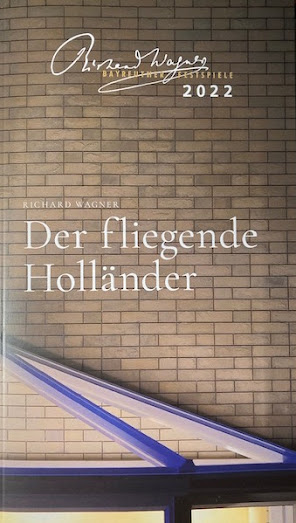
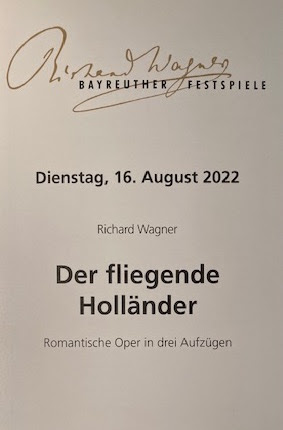
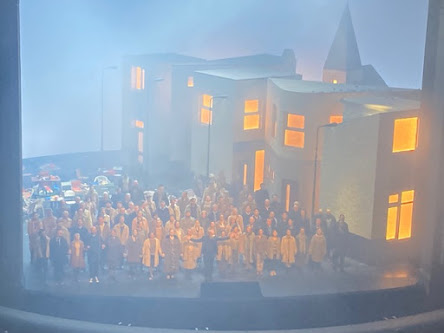

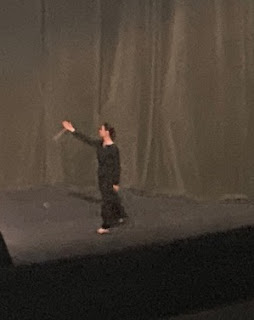



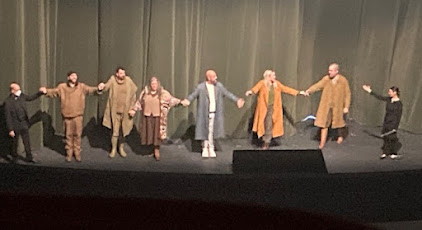

Sem comentários:
Enviar um comentário